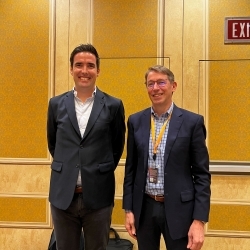
It is thrilling to be a part of Southeast Asia’s rapid digital development. The region’s full economic potential cannot be unlocked unless the growing digital skills gap is closed. This is especially true in light of the current economic conditions. In order to meet the problems that will arise in 2023, it is crucial that governments, businesses, and educational institutions all work together to prioritise skill development.
At AWS re:Invent 2022, Amazon Web Services (AWS) announced that it has educated over 700,000 workers in Southeast Asia since 2017 in cloud-related skills. AWS is ecstatic to have reached this significant milestone but as the company’s spokespeople noted today, they are well aware that more work remains to be done. There are still some doubts that in the next few years, reskilling and upskilling will lead to improved workplace productivity, more success for enterprises, and a stronger economy as a whole. However, AWS is prepared for the challenge.
 Conor McNamara, Managing Director, ASEAN, AWS said, “According to AlphaBeta research, there will still be a need for 86 million more technology workers to support the growth in Southeast Asia, next year. Three of the top five skills mentioned are cloud-related skills, migration, cybersecurity, and application development. So, it’s really exciting overall, in terms of the momentum that we’re seeing.”
Conor McNamara, Managing Director, ASEAN, AWS said, “According to AlphaBeta research, there will still be a need for 86 million more technology workers to support the growth in Southeast Asia, next year. Three of the top five skills mentioned are cloud-related skills, migration, cybersecurity, and application development. So, it’s really exciting overall, in terms of the momentum that we’re seeing.”
The staggering amount highlights the need to institute training procedures to address the issue. It was also discovered in the same study that workers outside of the IT industry worry about being unprepared for the digital future because of inadequate training. Tech workers in Singapore and Indonesia were more likely than non-tech workers to participate in digital training (52% vs. 81%). Nevertheless, the desire among non-tech workers to learn technological skills is strong, which is very promising.
Growing an Inclusive Pool of Talent
According to Eric Conrad, Regional Managing Director, ASEAN, AWS, industries, and governments can build a diverse talent pool by developing micro-skills training courses that help workers upskill quickly, find employment, and bridge skills gaps to drive economic growth.
“AWS re/Start is our free 12-week program that helps unemployed and underemployed individuals with little to no tech experience build entry-level cloud computing skills and get connected with employers. To date, we’ve launched AWS re/Start in Australia, India, Indonesia, Malaysia, New Zealand, Pakistan, the Philippines, Singapore, Sri Lanka, and Vietnam,” said Eric.
High school and vocational students, including those with disabilities, are being taught fundamental cloud computing skills in Bahasa Indonesia through the free AWS Laptops for Builders programme, which is exclusive to Indonesia and backed by the Indonesian government. This cloud education programme is being delivered by AWS in collaboration with local NGOs Sagasitas and Nahdatul Ulama to better prepare students for employment in technology and the cloud. In the end, it will aid the digital development of Indonesia and benefit people all around the archipelago.
Developing Tomorrow’s Stars, Today
In addition, AWS is also working to make learning opportunities accessible to everyone and equitable for APJ’s varied population. Higher education institutions may access free, ready-to-teach cloud computing courses from AWS Academy, which will equip students to pursue industry-recognized AWS Certifications and in-demand cloud employment that will boost local economies.
People as young as 13 can use the free, self-paced training materials offered by AWS Educate to develop their cloud abilities. English, Simplified Chinese, Japanese, and Korean learners have access to hundreds of hours of training and materials.
Not to mention, together with the United States Agency for International Development (USAID), AWS is currently assisting Vietnam’s top seven universities with updating their curricula. In order to integrate cloud content into their degree courses, AWS is offering technical assistance and educator training.
To aid recent graduates in their search for tech jobs in Singapore, AWS is working with Skilio, a platform for skills-based hiring. By providing women and girls with the cloud knowledge and skills they need to succeed in the digital workforce, the cloud provider is also assisting the “Women in Tech” group at Singapore Management University.
 Eric adds, “At AWS, one of the things we are focused on is creating equitable learning opportunities for diverse populations. We want to help more women pivot into the tech industry. 96% of women surveyed in Singapore and Indonesia recognise the importance of having digital skills for their jobs and future careers but only 82% have done any training since the pandemic. To cater to this need for female learners in ASEAN, we have AWS SheDares. This is a free online learning program that aims to inspire professional women to consider a career in tech and introduce them to the right pathways to get there.”
Eric adds, “At AWS, one of the things we are focused on is creating equitable learning opportunities for diverse populations. We want to help more women pivot into the tech industry. 96% of women surveyed in Singapore and Indonesia recognise the importance of having digital skills for their jobs and future careers but only 82% have done any training since the pandemic. To cater to this need for female learners in ASEAN, we have AWS SheDares. This is a free online learning program that aims to inspire professional women to consider a career in tech and introduce them to the right pathways to get there.”
Enabling Innovation Despite Economic Difficulties
Employers must immediately upskill and reskill their employees due to the growing skills gap and the weakening global economy. To address the increased demand for expertise in cloud computing, machine-learning, and other cutting-edge technology that will help our region weather financial instability, AWS says that they will continue to invest in their training programmes.
Based on the information shared during the media briefing, it seems AWS continues to be steadfastly devoted to collaborating with organisations, schools, and businesses to advance digital capabilities and reduce the skills gap by providing a variety of training options that are effective for all types of students. Despite the economic challenges, by working together, AWS hopes it can ensure that workers acquire digital literacy to support business growth and involve everyone in ensuring the continued prosperity of our beloved region.




